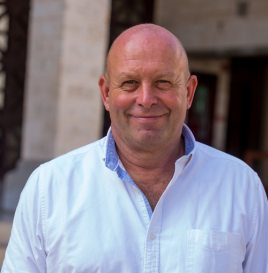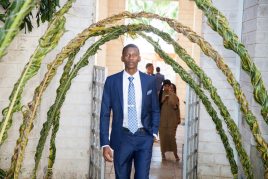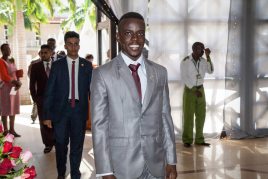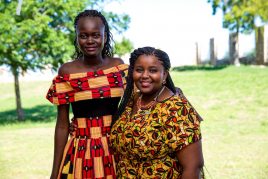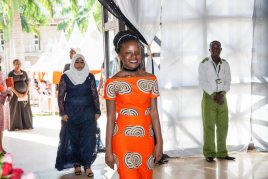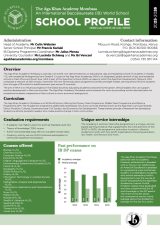Talent Identification Students: Creators of destiny
One of the great African presidents, Julius Nyerere, once said that the point of education was to turn creatures of destiny into creators of destiny. As the Dean of Admissions and Financial Aid at the Aga Khan Academy Mombasa, I have passionately led a Talent Identification Programme for nearly ten years now. The programme identifies “creators of destiny”, students in Year 6 in Kenyan government schools, in deprived socio-economic and educational areas of Kenya, who are academically able and show leadership potential. This May, seven of these students have fulfilled part of their destiny, in graduating from the IB Diploma Programme. Six of these seven students have secured a path to their next destination in life, by gaining access to some of the best universities in the world, on full scholarships. The Academy has guided and nurtured the students to have the confidence to become “creators of destiny”. The vision of His Highness the Aga Khan is that these students, as well as other members of the 2018 graduating class, will go out and be creators of change in their own communities.
As a teacher, the idea of educating a child for profit has always repelled me. The Academy’s inclusive culture was one of the factors that appealed to me when I first applied for the post at the school, as was the opportunity to lead the Talent Identification Programme. (Coming from a very working class background myself, I know that my parents would never have afforded me the opportunity to gain access to a secondary or higher education, without the assistance of the state system in the United Kingdom). From the outset, I can honestly say that not all teachers were supportive of bringing these students into the school’s residential programme. I did have a picture in my mind of how successful this could be from my work at previous schools, but I must admit, I did have sleepless nights about the scale, severity and scope of it all.
The assessment process in identifying these students has evolved and refined over the years. One very important aspect of innate leadership that is assessed is that of inferential thinking, the ability to make connections across different areas of knowledge. From this graduating cohort, I always remember one of the students exhibited exceptional ability in this area. Japheth Otieno, at the age of 11 then, referred to the inter-relation between governments causing difficulties in a problem solving activity when he mentioned, “Imagine that a Country A is helping Kenya with aid and money. Imagine that another Country B is an enemy of Kenya. Conflict may arise between Countries A and B, as there is suspicion over the reasons for this assistance to Kenya.” In the selection interviews, we look for students who are likely to question their world, have a keen sense of justice and morality, have good verbal communication skills and a sense of extra-curricular involvement. Japheth impressed me with his references to whether there was a multi-level universe or not and his passion for his kitchen garden, where he had initiated some preventative measures for protecting his plants. Japheth has now secured a place with the King-Morgridge Scholarship at the University of Wisconsin Madison in the United States.
I am delighted that this cohort sees the first student from the Ganze area, William Baya, graduating. I remember meeting William for the first time in 2011. At that time, the Kilifi County Governor reported widespread hunger in some parts of the county, especially for families living in the semi-arid areas. Learning in hundreds of primary schools in hunger-stricken parts of the country had been paralysed as the government dispatched emergency relief supplies. It was against this backdrop that we first met William, then a student at Vitengeni Primary School. William had already showed some leadership traits with him being involved as a scout commander and a school prefect. His school felt that he was a responsible and determined pupil. He mentioned about working hard in life so that he could target his goals – his motto at that time was “front ever, back never”. The self-drive William displays from adhering to this motto has guided him through the six years at the school and given him a full scholarship to attend Washington and Lee University in the United States. On learning of this, his father beaming with great pride said, “The Aga Khan Academy Mombasa has transformed my boy and that I am looking forward to him to come back and work for the community to repay the Aga Khan's contribution.”
One unique aspect of the Aga Khan Academy Mombasa, is its double heritage of world-mindedness and its proud East African identity. Since the inception of the school in 2003, Swahili has been compulsory for all students up to 14 years of age. His Highness recognised the need for young leaders to be able to communicate in their national language with other members of their community. (It is interesting to note that other non-national schools have only recently introduced Swahili into the curriculum for all students after a recent government directive). The Academy is at the forefront of academic thinking and is always forward thinking.
The development of the students in the school to “creators of destiny” is by no means left to chance. From this double heritage foundation, important concepts such as those of meritocracy, pluralism, ethics and other virtues and attributes that make up the students’ learner profile, have been integrated into all aspects of the curriculum. The students are allowed to run the risk, among other things, of failure because the privation of not succeeding can be an excellent teacher. Students are also given responsibility so that they can experience and learn from taking leadership roles. This is encouraged in every student. The students take charge in aspects of enrichment, academics and service, so that they are held accountable and answerable for their decisions, both when they get it right and when they fail.
Prudence Hainga after graduating this year will join the University of Edinburgh to study Political Science. Prudence reflected on what this scholarship meant to her and her community. “I want to realise my childhood dream of fighting injustice and corruption in Kenya. Having experienced and witnessed different levels of inequality in my country, I want to delve into a career path that will help me change what has become a detrimental routine in my country. The Kenyan political system is majorly defined by tribalism and inequality. Therefore, learning how political systems function and what others have done to ensure sustainable development as well as spread out opportunities for their citizens, will help me to decipher ways in which I could impact change in my country’s political system and rid Kenya of tribalism and greed. I am motivated to use my knowledge as a weapon against discrimination and inequality and work for a better Kenya – a Kenya that feels like home to all.”
These young men and women who have benefited from this progamme, did not have a great deal when they first came to the Academy, and their future was continually uncertain, with parents struggling to secure jobs, keep food on the table as well as educating their children. To see them grow and nurture and fulfil what was expected of them at this moment in time brings a lot of satisfaction. I have taught in many schools throughout the world, but there is something unique and special about this graduating class and other students at the school. The school recently had a visit from the representative from the International Baccalaureate Organization. On commenting on the school the one thing that stood out in my mind was his reference to the children here. He simply said that the children were “staggering”. These staggering students are helping to fulfil our mission for the Aga Khan Academy Mombasa that fits with building a better Kenya.
By Paul Davis

